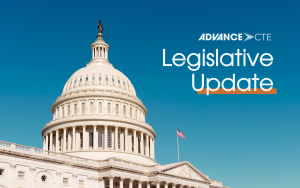
This week, the federal government shut down after Congressional lawmakers failed to make progress on compromise funding legislation for the new 2026 federal fiscal year (FY26). Elsewhere, ED announced new recognition of student achievement, changes to mental health grants, and postsecondary rulemaking begins to get underway.
Federal Government Shutdown
The formal start of FY26 began this week for the federal government on Wednesday, October 1. As Advance CTE has previously shared, lawmakers in Congress have struggled to find agreement on full-year funding bills for all segments of the federal budget, including Labor-HHS-Ed funding legislation, which provides support for Perkins V’s state grant program. As a consequence, a short-term extension of current federal funding, known as a continuing resolution (CR), is needed. Unfortunately, disagreement over a CR has persisted this week, resulting in a lapse in federal funding and a shutdown of most of the federal government.
The impasse primarily stems from disagreements between Republicans and Democrats over the inclusion of healthcare subsidies within a CR. Congressional Democrats have continued to insist on including these subsidies in exchange for their needed support to pass a CR through the Senate, due to the chamber’s filibuster rules. Republicans have remained resistant to these demands.
The U.S. Departments of Education (ED) and Labor (DOL) have both published contingency plans—here and here—outlining how they will operate during this period. Additionally, the DOL issued new guidance regarding the availability of funding.
There are concerns that the longer a shutdown lasts, the more bottlenecks and backlogs will accumulate, which Congress will have to address through FY26 appropriations legislation. Senate Majority Leader John Thune (R-SD) says it is unlikely that the Senate will work through the weekend if an agreement is not reached regarding a House-passed CR that funds the government through November 21.
Advance CTE will continue to monitor the progress of appropriations talks and the potential impact this has on education and workforce programs.
CTE Learners Recognized through U.S. Presidential Scholars
Each year, the U.S. Presidential Scholars Program recognizes a select group of graduating high school seniors who have distinguished themselves in academics, arts, and Career Technical Education (CTE). This year, twenty CTE scholars were recognized in the program, encouraging a broader recognition of diverse pathways to celebrate academic achievement and technical ability. The inclusion of CTE learners in this national spotlight is a clear indication that technical and academic learning are effective strategies to prepare learners for college and careers beyond high school. Read more about the scholars program here.
This summer, Advance CTE executive director Kate Kreamer highlighted why the “AND” in college and career readiness matters. Read Kate’s blog here.
Negotiated Rulemaking for Higher Education Continues During Shutdown
The previously planned negotiated rulemaking committee for Reimagining and Improving Student Education (RISE) moved forward this week to meet statutory deadlines required under the One Big Beautiful Bill Act (OBBBA). These negotiation sessions are focused primarily on student loan issues, including how to define “professional students” in dual-degree programs, proposed borrowing limits, and new rules for part-time borrowers that would pro-rate loan eligibility.
However, due to the government shutdown, these negotiations have now been rescheduled for later this month. This is the first of two negotiated rulemaking committees set to take place this year. In early December, the AHEAD table is scheduled to meet to negotiate rules guiding the implementation of Workforce Pell, as well as several other issues related to new accountability frameworks and expectations for postsecondary education.
Read more about both of these negotiated rulemaking efforts here.
ED Makes Mental Health Grants Available
New grant programs specifically designed to support mental health in schools were announced in the Federal Register earlier this week. The grant programs are for mental health service professional demonstrations, a new award to fund partnerships and place mental health professionals in high-needs schools, and an existing program that builds a pipeline of providers through graduate training, as well as two grant funds that are available to hire more staff and expand mental health services in K-12 schools.
Advance CTE’s senior communications associate, Jodi Langellotti, wrote a blog series about CTE and mental health. The series details how CTE is a protective factor for mental health and how that can be leveraged in developing relationships, buffering the impacts of trauma, and incorporating further through recruitment communications.

